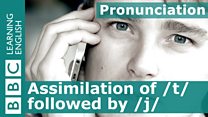Unit 25: English You Need
Exams, news, pronunciation, teachers' tips, learners' questions
Select a unit
- 1 English You Need
- 2 English You Need
- 3 English You Need
- 4 English You Need
- 5 English You Need
- 6 English You Need
- 7 English You Need
- 8 English You Need
- 9 English You Need
- 10 English You Need
- 11 English You Need
- 12 English You Need
- 13 English You Need
- 14 English You Need
- 15 English You Need
- 16 English You Need
- 17 English You Need
- 18 English You Need
- 19 English You Need
- 20 English You Need
- 21 English You Need
- 22 English You Need
- 23 English You Need
- 24 English You Need
- 25 English You Need
- 26 English You Need
- 27 English You Need
- 28 English You Need
- 29 English You Need
- 30 English You Need
Session 1
Are you working towards an important exam? We're here to help with a series of videos that pick out some top tips for studying and taking exams.
Activity 1
Exam skills: 5 tips about taking notes
Taking notes helps you remember
If you're studying English in a classroom you're going to have to make notes. They're useful ways of helping you to remember things and review what you've learnt – so it's important to do it right.
Watch this video to find out five top tips to help you with your note taking. Then test your understanding in our quiz.
[Images: Getty Images]
Watch the video

Rob
If you're studying English in a classroom you're going to have to make notes. They're useful ways of helping you to remember things and review what you've learnt – so it's important to do it right. Here's our top tips about taking notes.
Start making notes for every lecture on a new page and date and number each page too. That way it's easier to look back at them later and find what you want.
There's a lot to remember in a lesson so note taking is crucial but don't write everything down. Write down the important bits – your teacher may suggest parts of the lesson that need noting – but don't rely on this.
And write down things in your own words – unless it's a direct quote, then be accurate. Make sure you understand what you have written and that you're making notes of the important bits.
Use words, abbreviations, symbols or even pictures to summarise what your teacher says. If you miss something, leave a gap in your notes, and get the information from them later.
After the lesson, use your notes. Remember to read through them after the lecture. You could also rewrite or expand them too. And discuss them with another student. This will help you remember the content better.
Note taking is an important and useful way to help you remember and revise what you've learnt. Getting this right will make your learning journey easier. Good luck!
______________________________________________________________________________________
Did you like that? Why not try these?


 ________________________________________________________________________________________________
________________________________________________________________________________________________
Here's a summary of our tips about note taking:
- Start each lecture with a new page
- Don't write everything down
- Write notes in your own words
- Use words, abbreviations, symbols or pictures
- Review your notes and discuss with others
To do
So what did you discover? Find out by taking our test…
How good are you at note taking?
4 Questions
Answer these 4 questions
Help
Activity
Answer these 4 questions
Hint
It's when it's someone else's words.Question 1 of 4
Help
Activity
Answer these 4 questions
Hint
You don't need to write everything down.Question 2 of 4
Help
Activity
Answer these 4 questions
Hint
They're there to help you remember.Question 3 of 4
Help
Activity
Answer these 4 questions
Hint
You don't want to miss anything so get help.Question 4 of 4
Excellent! Great job! Bad luck! You scored:
Next
In this BBC Learning English drama called English at University, new student Anna is learning how to take notes.
This is a BBC Skillswise guide to writing notes.
Why not check out the rest of our Exam Skills series on our You Tube channel.
Have you got any tips about learning strategies and exam preparation that you can share with us? Please email them to us at learningenglish@bbc.co.uk with 'Exam Skills' in the subject line. We will post our favourites here and on our Facebook page. Please note that we can’t reply to individual emails, but we do read all of them.
End of Session 1
Next, join us for News Review, where we'll bring you key words and phrases from the latest stories and show you how to use it in your everyday English.
Session Vocabulary
noting
writing downabbreviations
short form of words or phrasesexpand
(here) making longer/more detailed